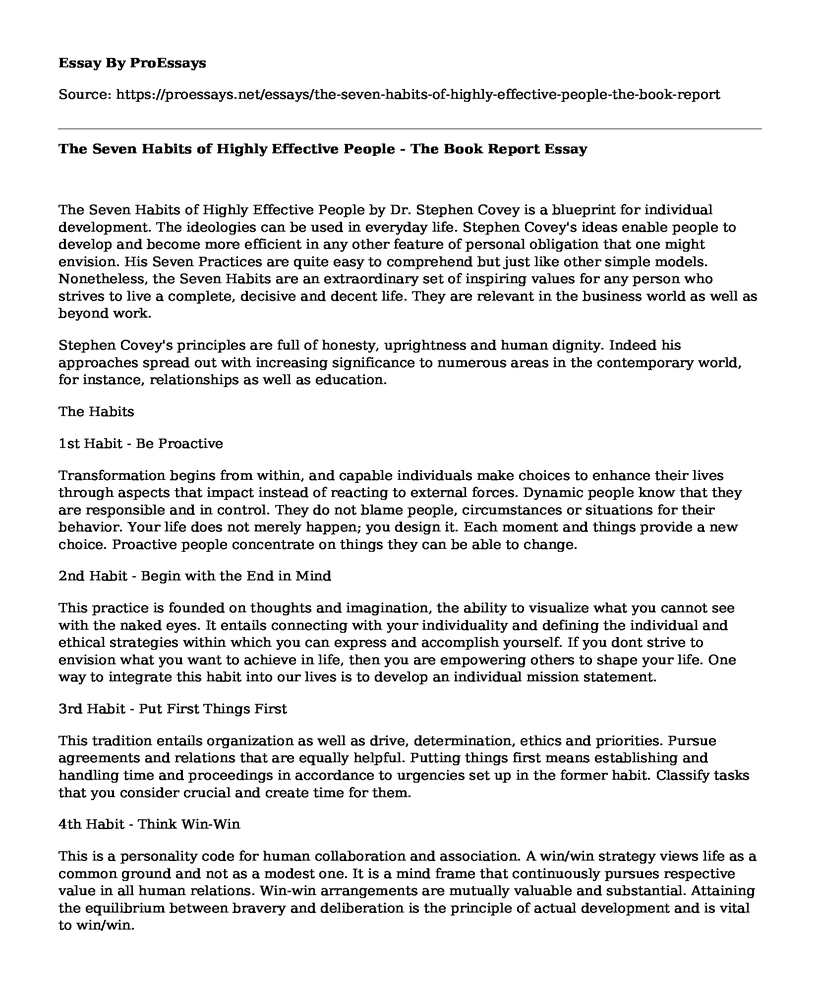The Seven Habits of Highly Effective People by Dr. Stephen Covey is a blueprint for individual development. The ideologies can be used in everyday life. Stephen Covey's ideas enable people to develop and become more efficient in any other feature of personal obligation that one might envision. His Seven Practices are quite easy to comprehend but just like other simple models. Nonetheless, the Seven Habits are an extraordinary set of inspiring values for any person who strives to live a complete, decisive and decent life. They are relevant in the business world as well as beyond work.
Stephen Covey's principles are full of honesty, uprightness and human dignity. Indeed his approaches spread out with increasing significance to numerous areas in the contemporary world, for instance, relationships as well as education.
The Habits
1st Habit - Be Proactive
Transformation begins from within, and capable individuals make choices to enhance their lives through aspects that impact instead of reacting to external forces. Dynamic people know that they are responsible and in control. They do not blame people, circumstances or situations for their behavior. Your life does not merely happen; you design it. Each moment and things provide a new choice. Proactive people concentrate on things they can be able to change.
2nd Habit - Begin with the End in Mind
This practice is founded on thoughts and imagination, the ability to visualize what you cannot see with the naked eyes. It entails connecting with your individuality and defining the individual and ethical strategies within which you can express and accomplish yourself. If you dont strive to envision what you want to achieve in life, then you are empowering others to shape your life. One way to integrate this habit into our lives is to develop an individual mission statement.
3rd Habit - Put First Things First
This tradition entails organization as well as drive, determination, ethics and priorities. Pursue agreements and relations that are equally helpful. Putting things first means establishing and handling time and proceedings in accordance to urgencies set up in the former habit. Classify tasks that you consider crucial and create time for them.
4th Habit - Think Win-Win
This is a personality code for human collaboration and association. A win/win strategy views life as a common ground and not as a modest one. It is a mind frame that continuously pursues respective value in all human relations. Win-win arrangements are mutually valuable and substantial. Attaining the equilibrium between bravery and deliberation is the principle of actual development and is vital to win/win.
5th Habit - Seek to Understand Then to Be Understood
Communication is the greatest skill in life. Most people strive to be understood first, and in doing so, the other party may be disregarded, only because they listen to reply and not to understand. First, listen to the other individual then seek to be understood. Stephen Covey describes this custom as the most relevant code of interactive relationships.
6th Habit - Synergize
This is the practice of creative cooperation according to Covey. Through a common point of view, one can resolve conflicts and find better solutions than would have been achieved by one or the other individuals solution.
7th Habit - Sharpen the Saw
This is the practice of personal transformation. Take some time out from work through personal rejuvenation of the psychological, spiritual, social and physical scopes.
Dr. Stephen Covey has created a significant frame of learning and educational tasks. The Seven Practices of Highly Effective People was his initial conception and undoubtedly is still paramount.
Cite this page
The Seven Habits of Highly Effective People - The Book Report. (2021, Apr 22). Retrieved from https://proessays.net/essays/the-seven-habits-of-highly-effective-people-the-book-report
If you are the original author of this essay and no longer wish to have it published on the ProEssays website, please click below to request its removal:
- Literary Essay on Romantic Poets
- Essay Example on Project Management Leadership
- Compare and Contrast Essay on the Novels "The Metamorphosis" and "The Trial"
- Paper Example on Burnout and PTSD
- How I Will Acknowledge the Cultural Diversity in My Workplace - Essay Sample
- Securing Information with a Database: A Necessity for Organizational Structures - Essay Sample
- Essay Example on Raskolnikov's Alienation from Society in Dostoyevsky's Crime and Punishment







